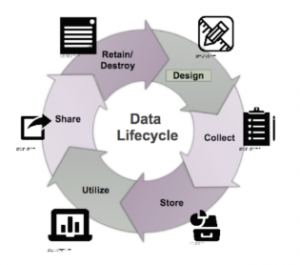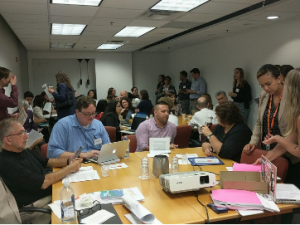Tools, tips and templates for making Responsible Data a reality
by David Leege, CRS; Emily Tomkys, Oxfam GB; Nina Getachew, mSTAR/FHI 360; and Linda Raftree, Independent Consultant/MERL Tech; who led the session “Tools, tips and templates for making responsible data a reality.“
For this year’s MERL Tech DC, we teamed up to do a session on Responsible Data. Based on feedback from last year, we knew that people wanted less discussion on why ethics, privacy and security are important, and more concrete tools, tips and templates. Though it’s difficult to offer specific do’s and don’ts, since each situation and context needs individualized analysis, we were able to share a lot of the resources that we know are out there.
that people wanted less discussion on why ethics, privacy and security are important, and more concrete tools, tips and templates. Though it’s difficult to offer specific do’s and don’ts, since each situation and context needs individualized analysis, we were able to share a lot of the resources that we know are out there.
To kick off the session, we quickly explained what we meant by Responsible Data. Then we handed out some cards from Oxfam’s Responsible Data game and asked people to discuss their thoughts in pairs. Some of the statements that came up for discussion included:
- Being responsible means we can’t openly share data – we have to protect it
- We shouldn’t tell people they can withdraw consent for us to use their data when in reality we have no way of doing what they ask
- Biometrics are a good way of verifying who people are and reducing fraud
Following the card game we asked people to gather around 4 tables with a die and a print out of the data lifecycle where each phase corresponded to a number (Planning = 1, collecting = 2, storage = 3, and so on…). Each rolled the die and, based on their number, told a “data story” of an experience, concern or data failure related to that phase of the lifecycle. Then the group discussed the stories.
For our last activity, each of us took a specific pack of tools, templates and tips and rotated around the 4 tables to share experiences and discuss practical ways to move towards stronger responsible data practices.
Responsible data values and principles
David shared Catholic Relief Services’ process of developing a responsible data policy, which they started in 2017 by identifying core values and principles and how they relate to responsible data. This was based on national and international standards such as the Humanitarian Charter including the Humanitarian Protection Principles and the Core and Minimum Standards as outlined in Sphere Handbook Protection Principle 1; the Protection of Human Subjects, known as the “Common Rule” as laid out in the Department of Health and Human Services Policy for Protection of Human Research Subjects; and the Digital Principles, particularly Principle 8 which mandates that organizations address privacy and security.
As a Catholic organization, CRS follows the principles of Catholic social teaching, which directly relate to responsible data in the following ways:
- Sacredness and dignity of the human person – we will respect and protect an individual’s personal data as an extension of their human dignity;
- Rights and responsibilities – we will balance the right to be counted and heard with the right to privacy and security;
- Social nature of humanity – we will weigh the benefits and risks of using digital tools, platforms and data;
- Common good – we will open data for the common good only after minimizing the risks;
- Subsidiarity – we will prioritize local ownership and control of data for planning and decision-making;
- Solidarity – we will work to educate inform and engage our constituents in responsible data approaches;
- Option for the poor – we will take a preferential option for protecting and securing the data of the poor; and
- Stewardship – we will responsibly steward the data that is provided to us by our constituents.
David shared a draft version of CRS’ responsible data values and principles.
Responsible data policy, practices and evaluation of their roll-out
Oxfam released its Responsible Program Data Policy in 2015. Since then, they have carried out six pilots to explore how to implement the policy in a variety of countries and contexts. Emily shared information on these these pilots and the results of research carried out by the Engine Room called Responsible Data at Oxfam: Translating Oxfam’s Responsible Data Policy into practice, two years on. The report concluded that the staff that have engaged with Oxfam’s Responsible Data Policy find it both practically relevant and important. One of the recommendations of this research showed that Oxfam needed to increase uptake amongst staff and provide an introductory guide to the area of responsible data.
In response, Oxfam created the Responsible Data Management pack, (available in English, Spanish, French and Arabic), which included the game that was played in today’s session along with other tools and templates. The card game introduces some of the key themes and tensions inherent in making responsible data decisions. The examples on the cards are derived from real experiences at Oxfam and elsewhere, and they aim to generate discussion and debate. Oxfam’s training pack also includes other tools, such as advice on taking photos, a data planning template, a poster of the data lifecycle and general information on how to use the training pack. Emily’s session also encouraged discussion with participants about governance and accountability issues like who in the organisation manages responsible data and how to make responsible data decisions when each context may require a different action.
Emily shared the following resources:
- Oxfam: Responsible Data Management
- Oxfam: Responsible Program Data Policy
- Oxfam: Responsible Data at Oxfam: Translating Oxfam’s Responsible Data Policy into practice, two years on
- Responsible Data Forum
Responsible data case studies
Nina shared early results of four case studies mSTAR is conducting together with Sonjara for USAID. The case studies are testing a draft set of responsible data guidelines, determining whether they are adequate for ‘on the ground’ situations and if projects find them relevant, useful and usable. The guidelines were designed collaboratively, based on a thorough review and synthesis of responsible data practices and policies of USAID and other international development and humanitarian organizations. To conduct the case studies, Sonjara, Nina and other researchers visited four programs which are collecting large amounts of potentially sensitive data in Nigeria, Kenya and Uganda. The researchers interviewed a broad range of stakeholders and looked at how the programs use, store, and manage personally identifiable data (PII). Based on the research findings, adjustments are being made to the guidelines. It is anticipated that they will be published in October.
Nina also talked about CALP/ELAN’s data sharing tipsheets, which include a draft data-sharing agreement that organizations can adapt to their own contracting contracting documents. She circulated a handout which identifies the core elements of the Fair Information Practice Principles (FIPPs) that are important to consider when using PII data.
Responsible data literature review and guidelines
Linda mentioned that a literature review of responsible data policy and practice has been done as part of the above mentioned mSTAR project (which she also worked on). The literature review will provide additional resources and analysis, including an overview of the core elements that should be included in organizational data guidelines, an overview of USAID policy and regulations, emerging legal frameworks such as the EU’s General Data Protection Regulation (GDPR), and good practice on how to develop guidelines in ways that enhance uptake and use. The hope is that both the Responsible Data Literature Review and the of Responsible Data Guidelines will be suitable for adopting and adapting by other organizations. The guidelines will offer a set of critical questions and orientation, but that ethical and responsible data practices will always be context specific and cannot be a “check-box” exercise given the complexity of all the elements that combine in each situation.
Linda also shared some tools, guidelines and templates that have been developed in the past few years, such as Girl Effect’s Digital Safeguarding Guidelines, the Future of Privacy Forum’s Risk-Benefits-Harms framework, and the World Food Program’s guidance on Conducting Mobile Surveys Responsibly.
More tools, tips and templates
Check out this responsible data resource list, which includes additional tools, tips and templates. It was developed for MERL Tech London in February 2017 and we continue to add to it as new documents and resources come out. After a few years of advocating for ‘responsible data’ at MERL Tech to less-than-crowded sessions, we were really excited to have a packed room and high levels of interest this year!
You might also like
-
Join us on May 15th for an AI+Africa Working Group Meeting: Shaping Our Priorities!
-
Event Recap: Tests of Large and Small Language Models on Common Evaluation Tasks
-
Girl Effect Guidelines on Ethical AI-Powered Social & Behaviour Change Chatbots
-
Tech Salon recap: listen more and shift away from Western-centric framing to better address online violence against women and girls
